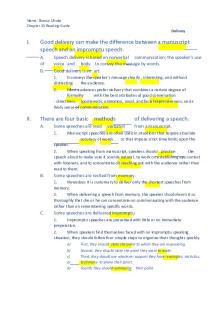Chapter 18 Reading Guide PDF

| Title | Chapter 18 Reading Guide |
|---|---|
| Author | Bianca Uhuka |
| Course | Fundamentals of Oral Communication |
| Institution | Northern Illinois University |
| Pages | 4 |
| File Size | 74.3 KB |
| File Type | |
| Total Downloads | 81 |
| Total Views | 165 |
Summary
Download Chapter 18 Reading Guide PDF
Description
I. Many special occasions provide opportunities for speechmaking. A. Occasions such as weddings, funerals, and dedication often include speeches. B. Speeches are part of what makes these occasions memorable and special. C. The primary aim of speeches on special occasions is neither to inform nor to persuade but to fulfill the special needs of the occasion.
II. Speeches of introduction present a speaker to an audience. A. A good speech of introduction achieves three goals 1.
It builds enthusiasm for the upcoming speaker.
2.
It generates enthusiasm in the speaker’s topic.
3. It establishes a welcoming climate that will boost the speaker’s credibility.
B. There are several guidelines for speeches of introduction. 1.
Speeches of introduction should be brief.
2.
Speeches of introduction should be completely accurate.
3.
Speeches of introduction should be adapted to the occasion.
4.
Speeches of introduction should be adapted to the main speaker.
5.
Speeches of introduction should be adapted to the audience.
6. Speeches of introduction should try to create a sense of anticipation and drama.
III. Speeches of presentation are given when someone receives a gift or an award. A. Speeches of presentation should usually be brief or be up to four minutes in length. B. The main purpose of a speech of presentation is to explain why the recipient is receiving the award. 1. The speech should discuss the recipient’s contributions for which the recipient is receiving the award. 2. The speech should point out the achievements in a way that will make them meaningful to the audience.
C. If the recipient won the award in a competition, the speech of presentation should consider praising the other competitors as well.
IV. Speeches of acceptance give thanks for a gift or an award.
A. A speech of acceptance should thank the people who are bestowing the gift or award. B. A speech of acceptance should also acknowledge the people who helped the recipient win the award.
V. Commemorative speeches are addresses of or celebration. A. Commemorative speeches pay tribute to a person, a group of people, an institution, or an idea. B. The fundamental purpose of a commemorative speech is not to inform your listeners but to inspire them - to heighten their admiration for the person, institution, or idea being praised. C. Although it usually presents information about its subject, a commemorative speech is different from an informative speech. 1. The aim of an informative speech is to communicate information clearly and accurately. 2. The aim of a commemorative speech is to express feelings and arouse their appreciation.
D. Commemorative speeches depend above all on the creative and subtle use of language.
1. Some of the most memorable speeches in history are commemorative addresses that we continue to find meaningful because of their eloquent expression. 2. Two aspects of language use are especially important for commemorative speeches. a)
The first is avoiding clichés and the trite sentiments.
b) The second is utilizing stylistic devices such as those discussed in Chapter 12 to enhance the imagery, rhythm, and creativity of the speech....
Similar Free PDFs

Chapter 18 Reading Guide
- 4 Pages

Chapter 18 study guide
- 4 Pages

Chapter 18 study guide
- 4 Pages

Chapter 5 Reading Guide
- 9 Pages

Chapter 8 Reading Guide
- 7 Pages

Chapter 15 Reading Guide
- 3 Pages

Chapter 15 Reading Guide
- 2 Pages

Chapter 5.1 Reading Guide
- 2 Pages

Chapter 11 Reading Guide
- 2 Pages

Chapter 14 Reading Guide
- 2 Pages

Chapter 13 Reading Guide
- 4 Pages

Chapter 1 Reading Guide
- 3 Pages

Chapter 7 Reading guide
- 9 Pages

Chapter 6 Reading Guide
- 3 Pages

Chapter 11 Reading Guide
- 12 Pages

Chapter 18-19 Study Guide
- 1 Pages
Popular Institutions
- Tinajero National High School - Annex
- Politeknik Caltex Riau
- Yokohama City University
- SGT University
- University of Al-Qadisiyah
- Divine Word College of Vigan
- Techniek College Rotterdam
- Universidade de Santiago
- Universiti Teknologi MARA Cawangan Johor Kampus Pasir Gudang
- Poltekkes Kemenkes Yogyakarta
- Baguio City National High School
- Colegio san marcos
- preparatoria uno
- Centro de Bachillerato Tecnológico Industrial y de Servicios No. 107
- Dalian Maritime University
- Quang Trung Secondary School
- Colegio Tecnológico en Informática
- Corporación Regional de Educación Superior
- Grupo CEDVA
- Dar Al Uloom University
- Centro de Estudios Preuniversitarios de la Universidad Nacional de Ingeniería
- 上智大学
- Aakash International School, Nuna Majara
- San Felipe Neri Catholic School
- Kang Chiao International School - New Taipei City
- Misamis Occidental National High School
- Institución Educativa Escuela Normal Juan Ladrilleros
- Kolehiyo ng Pantukan
- Batanes State College
- Instituto Continental
- Sekolah Menengah Kejuruan Kesehatan Kaltara (Tarakan)
- Colegio de La Inmaculada Concepcion - Cebu